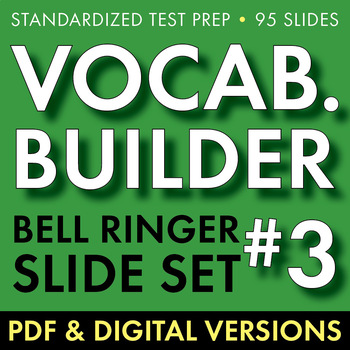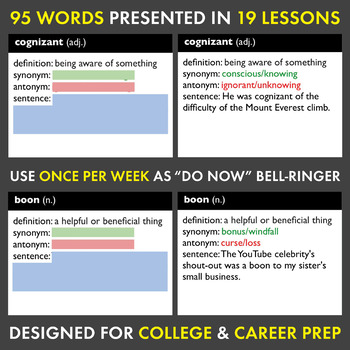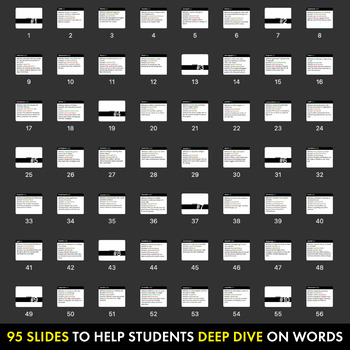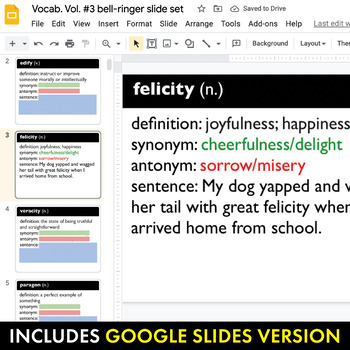Vocabulary Bell-Ringers Vol. 3 for High School Students, Test Prep, CCSS
- Zip
- Google Apps™

What educators are saying
Description
Welcome to Words on Wednesday, a weekly bell-ringer/mini-lesson to build higher-level vocabulary with your high school students. These weekly lessons feature words commonly used on the SAT and ACT that educated adults also use in their everyday lives. Even if your students aren’t bound for a university, they’ll still benefit from adding these words to their vocabulary before they enter the work force.
Each lesson, which takes about 15 minutes, goes deep into understanding denotation and connotation of five words and includes definition, part of speech, synonym, antonym, and a sentence relevant to a teen audience. Instead of using a list of 10 words each week that students memorize and then promptly forget, I’ve found more success with going deep on five words. We discuss the words and use them in regular conversation. I’ve been delighted to see many of these words show up in our in-class writings, and students also excitedly point them out to me in passages that we read in class. This method helps words “stick” better than any other method I’ve tried in my 20+ years as a high school teacher.
Most semesters run 18 weeks, but I’ve included 19 lessons in case you have an extra Wednesday (or whatever day you want to use them) in your school calendar. I have successfully used these lessons with seniors, juniors, and advanced underclassmen.
Download includes:
95 slides (19 bell-ringer/mini-lessons of five slides each) in PDF, PowerPoint, SMARTBoard, and Google Slides formats
1-page master list of the vocabulary words in PDF to provide an easy reference/checklist
Want another semester of vocabulary lessons?
Click here for Vocabulary Builder Vol. 1
Click here for Vocabulary Builder Vol. 2
Click here for Vocabulary Builder Vol. 4
Want to fold more academic skill builders into your bell-ringer routine?
Click here to learn more about M.U.G. Shot Monday.
Click here to learn more about Lit. Term Tuesday.
Click here to learn more about Three of a Kind Thursday.
Click here to learn more about SSR Friday.
This product is included in the full-year bell-ringer vol. 2 bundle. Click here to read more about this discounted bundle that includes two M.U.G. volumes, two brain teaser volumes, and two vocabulary builder volumes.
Thanks for stopping by!





